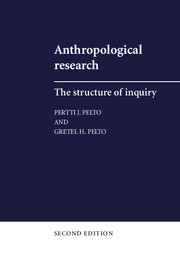Book contents
- Frontmatter
- Contents
- Preface to second edition
- Preface to first edition
- 1 The domain of methodology
- 2 Science and anthropology
- 3 Operationalism in anthropological research
- 4 Units of observation: emic and etic approaches
- 5 Tools of research – I
- 6 Tools of research – II: nonverbal techniques
- 7 Counting and sampling
- 8 Measurement, scales, and statistics
- 9 Art and science in field work
- 10 Research methods, relevance, and applied anthropology
- 11 Building anthropological theory: methods and models
- Appendixes
- Bibliography
- Index
Preface to second edition
Published online by Cambridge University Press: 05 June 2012
- Frontmatter
- Contents
- Preface to second edition
- Preface to first edition
- 1 The domain of methodology
- 2 Science and anthropology
- 3 Operationalism in anthropological research
- 4 Units of observation: emic and etic approaches
- 5 Tools of research – I
- 6 Tools of research – II: nonverbal techniques
- 7 Counting and sampling
- 8 Measurement, scales, and statistics
- 9 Art and science in field work
- 10 Research methods, relevance, and applied anthropology
- 11 Building anthropological theory: methods and models
- Appendixes
- Bibliography
- Index
Summary
In the six years since the first appearance of this book the trend toward greater interest in methodological issues has continued. Most graduate programs in anthropology now include training in the structure of scientific research; training in statistics and computer use has increased steadily, and several books devoted to research paradigms and statistics-for-anthropologists have appeared.
The growth of interest in methodology has sharpened certain longstanding philosophical and theoretical issues in anthropology. The central methodological debate of the 1970s continues to be the conflict between quantitative methods and the supposedly more personalized and humanistic qualitative scholarship. Closely linked to this issue is the continuing discussion about emic versus etic data. Contrary to our earlier expectations, that anthropological conversation remains lively today and attention to the emic-etic issue has livened other disciplines as well.
Reflecting on these issues, we find that our views about them are not much changed from six years ago. Then, as now, we argue for a judicious mixing of quantitative and qualitative research. The problem is not which mode of data gathering to use but how to integrate both to build credible and effective anthropological knowledge. The goal of research is to develop useful and credible information. Credibility, in matters of human behavior, can never rest finally on purified numerical analysis. Nor can it depend wholly on rich verbal description that ignores underlying questions of quantity and intensity.
- Type
- Chapter
- Information
- Anthropological ResearchThe Structure of Inquiry, pp. ix - xiiPublisher: Cambridge University PressPrint publication year: 1978



